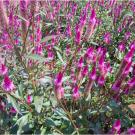This poster was presented by Stephen Weller of Purdue University at the Horticulture Innovation Lab's 2010 Inception Workshop in Singapore in relation to the project focused on "Increasing production of indigenous African leafy vegetables in Kenya."
Project Summary and Goals
This project aims to enhance the potential for production, utilization and marketing of African leafy vegetables in Western Kenya for important African leafy vegetable species including spider plant (Cleome gynandra), African nightshades (Solanum scabrum/S. villosum/S. americanum/S. tarderomotum) and amaranths (Amaranthus blitum/A. dubius/A. hybrdus /A. spinosus). Indigenous African leafy vegetables contain higher levels of nutrients than commonly grown exotic species like Swiss chard, kale and cabbage. They are rich in proteins (17.4-38.3% of dry matter), carbohydrates, vitamins and minerals and have medicinal properties. These vegetables are popular in cultural diets and there is excellent potential for increased production and use in areas of traditional culture. Our goal is to establish a base of information and experience for greater production and use of indigenous vegetables that in the long-term will provide a source of food for economic security and improved nutrition for Kenyans, especially those afflicted with HIV/AIDS and women farmers. Activities include imparting knowledge on African leafy vegetable germplasm, establishing/improving local seed banks, providing quality seeds for production, transfer of improved production techniques to stakeholders, organization of self-help groups and farming and market analysis surveys. Participatory approaches will be used to achieve these project goals and impact target groups.
Objectives
- Assess and enhance genetic resources of African leafy vegetables in Kenya
- Improve African leafy vegetable seed system availability to Kenyan stakeholders
- Develop and disseminate improved horticultural practices and post-harvest technologies for African leafy vegetables
- Develop marketing strategies for African leafy vegetables
- Promote educational programs on African leafy vegetables for farmers and other community groups
Anticipated Outcomes
- Development of a comprehensive research and education agenda for effective African leafy vegetable production and marketing
- Identify obstacles and solutions to production and marketing of African leafy vegatables in western Kenya
- Develop education programs for all stakeholders on production, post-harvest handling, marketing and consumption for African leafy vegetables
- Improve synergies for collaboration of all participating universities, organizations and government entities in the project
Outreach Activities
- Provide information on African leafy vegetables by effectively reaching stakeholders in Western Kenyan farming communities with proactive outreach programs of education, demonstration and hands-on participation in new and improved African leafy vegetable production technologies
- Farmer’s field days and exchange visits will be organized to enable lead farmers to share experiences facilitating face-to face deliberations and exchange of ideas between farmers and our team
- Train (training of trainers) lead farmers, mainly literate women and community leaders, in critical production and marketing skills
- Extension staff will transfer knowledge to the community on challenges and solutions for production inefficiencies
- Establish a research agenda for the African leafy vegetable sector in Kenya
Impacts
- Identify through farm and market surveys production and market access needs to allow development of effective information transfer mechanisms to stakeholders
- Increase farmers’ income and consumer nutrition
- Create synergies resulting in improved knowledge systems and increased human capacity
- Ensure women and other disadvantaged farm sector workers have access to our programs
- Identify gender issues and barriers to greater female participation in African leafy vegetable production and market systems
- Beneficiaries will be small-scale resource-poor farmers and consumers, village communities, NGOs and local public and private seed sectors

